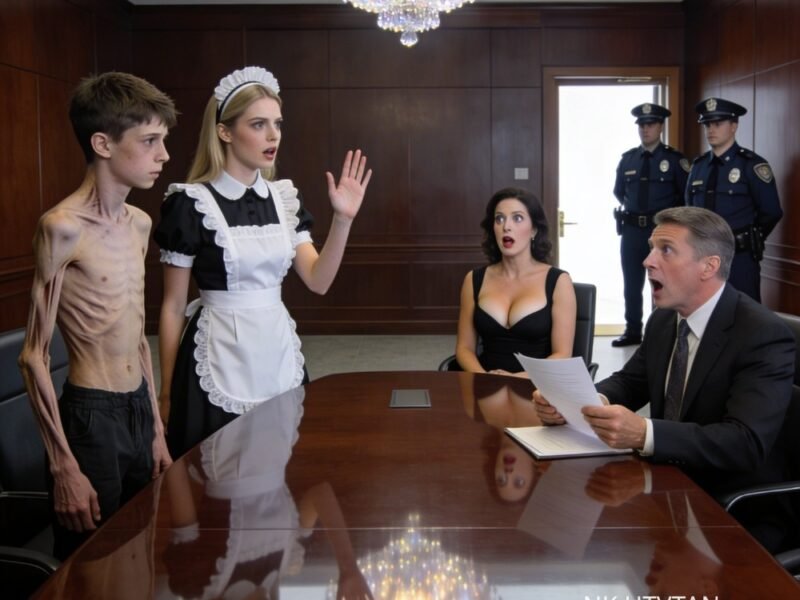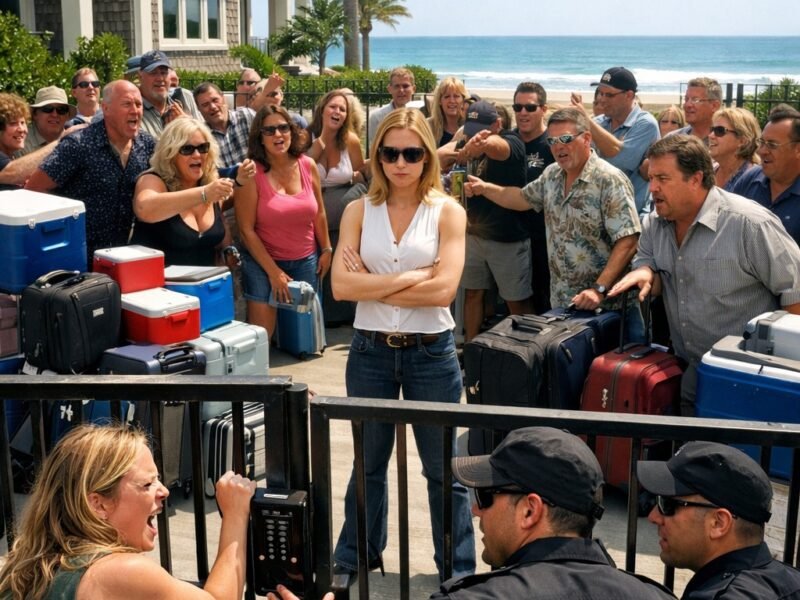On December 26, 2004, what was supposed to be a perfect holiday for a Spanish family turned into a nightmare beyond comprehension. The idyllic beaches of Khao Lak in Thailand, where thousands of tourists had gathered, became the scene of an unimaginable disaster. The Indian Ocean tsunami, triggered by a massive earthquake off the coast of Sumatra, unleashed a wall of water that swallowed everything in its path, and for one family, the wave became a fight for survival that would forever change their lives.
María Belón, her husband Enrique, and their three sons—Lucas, Tomás, and Simón—had come to Thailand to enjoy a vacation. The holiday was meant to be a moment of joy and family bonding. But in an instant, their world was shattered. The tsunami hit with such force that it felt as if the earth itself exploded beneath their feet. María would later recall the roar, louder than anything she could have ever imagined, followed by the devastating surge of water that swept everything away.
“I thought, I’m going to die here,” María said. “I can’t breathe. I can’t fight this.” In that terrifying moment, as the water dragged her under, María was struck by debris, and for a split second, she truly believed that her life had come to an end.
When the water finally released its grip on her, María found herself alone, submerged in the chaos. She gasped for air and screamed for her children, but the only sound she could hear was the deafening roar of destruction. The world had gone silent around her, and in that terrifying quiet, she feared the worst. As she fought to stay afloat, her thoughts were consumed with the safety of her family. She didn’t know where they were, or if they were alive.
Through the wreckage, María desperately swam, her heart pounding with dread. But against all odds, she spotted her eldest son, Lucas, clinging to a tree, his body battered and bruised but still alive. The sight of him was a miracle. With no time to process the emotions flooding her, María and Lucas immediately set out to help others who were trapped, bleeding, and terrified, believing that the rest of their family was gone. They made their way through the destruction, surrounded by bodies, the smell of death permeating the air. Yet, despite the overwhelming loss and the horror around them, they couldn’t stop searching. They had to find Enrique, Tomás, and Simón.
For days, María and Lucas roamed the wreckage, checking hospitals, asking strangers, and desperately hoping for a miracle. In those days, the world outside their suffering seemed to have stopped. Chaos reigned. Yet, amidst all the tragedy, they never gave up. They clung to the hope that somehow, somewhere, the rest of their family was still alive.
After what seemed like an eternity of searching and facing the unthinkable, the Belón family was finally reunited. The moment they found each other was surreal. It was a moment María would never forget: “We had seen so much death and destruction, and to find each other alive felt unreal,” she said, tears streaming down her face. “It was beyond belief.”
The journey of survival for María and her family was one of resilience, courage, and love. The film The Impossible, directed by J.A. Bayona, brought their harrowing story to the big screen, starring Naomi Watts as María and Ewan McGregor as Enrique. The film not only captured the brutal reality of the tsunami but also highlighted the deep humanity that emerged amidst the horror. It was not just a story of survival—it was a story of love, of hope, and of miracles that defied the odds.
“It’s not just our story,” María said of the film. “It’s about every person who was there—every scream, every loss, every miracle.” In the aftermath of the disaster, María’s perspective on life had changed forever. The survival of her family was a miracle, but it also left scars that would never fully heal. They had been through the impossible, and it had transformed them.
For María, surviving the tsunami was both a curse and a gift. “We lived through the impossible,” she said. “And it changed everything.” The trauma of that day, the loss, and the horror would forever remain a part of her, but so would the strength and resilience that she discovered within herself and her family. The experience had given them a new understanding of life, of the preciousness of each moment, and the importance of love and connection in the face of unimaginable pain.
The tsunami had taken much from them, but it also gave them the opportunity to rebuild, to heal, and to embrace each other in a way that no disaster could ever take away. Their family had been shattered and then remade, a powerful testament to the human spirit’s ability to endure, to survive, and to find light even in the darkest of times.
For María Belón and her family, the tsunami was a tragedy that none of them will ever forget. But it was also a story of hope, of a love that refused to be extinguished by the tide of despair. Through their survival, they proved that even in the face of the impossible, humanity’s will to live, to love, and to fight for one another will always endure.
María’s words resonate with anyone who has faced adversity: “It’s about every person who was there.” The tsunami was not just their story—it was the story of thousands who fought, survived, and came together in the aftermath of one of the deadliest natural disasters the world had ever seen. And for the Belón family, their survival was not just about escaping the storm—it was about finding each other, in a world that had been torn apart, and creating a new beginning from the wreckage.
The Quiet Strength of Hope: A Mother’s Journey Through the Fight Against Leukemia and the Uncertainty of Healing. 1696
One hundred and thirty-five days.
That’s how long we’ve been living inside this fight. A fight that has altered the rhythm of our lives, transforming what used to be simple, routine days into a blur of fear and hope. For one hundred and thirty-five days, we’ve breathed through every fear, clung to every moment, and waited for every test, as though it could change everything. And now, with four days left to go, the weight of it all feels both unbearable and sacred.
Four days until the “smart drug” treatment ends. Four more mornings of IV bags and whispered prayers, the rhythmic hum of machines and the quiet sound of nurses moving through the halls. Four days left, and then… a pause. A breath. A moment to stand still before we begin again.
Soon, they’ll test him again, searching for the cells that we so desperately hope are gone. They’ll look for the trace of leukemia that has haunted our every step, and in the pit of my stomach, I already know the answer. There won’t be any. There can’t be any. Not this time.
But the truth is, no one really knows. No one can ever predict exactly how this journey will unfold. I’ve seen too many parents come and go, too many families fighting battles just like ours, their hearts breaking in exactly the same ways. The questions never really stop. “How long will it take? When will he get better?” The truth is, no one can answer them. Not really. Not with certainty. But I’ve learned something during these months that I can offer her — this new mother in the ward, who arrived with the same questions I once had, the same fear and uncertainty that once paralyzed me.
“Every child with leukemia writes their own book. Welcome to ours.”
As I spoke the words, I saw the uncertainty in her eyes. I saw the rawness of her grief, the desperate need for something to hold on to, to believe in. And I remembered how it felt when I was in her shoes. Just a few months ago, I was sitting in that same chair, feeling the weight of the world pressing down on my chest, terrified of the unknown. The sleepless nights, the endless questions, the relentless fear that kept me awake — it all rushed back as I watched her walk away, her shoulders hunched with the burden of a mother’s worry.
But as I sat there, watching her retreat down the hallway, I realized that something had changed. I wasn’t the same person I was when I first arrived at this hospital. The mother I had been before this journey was full of fear, desperate for certainty. But now, after everything, I had learned that strength doesn’t come from having answers. It comes from continuing, from breathing through the fear, from surviving each moment as it comes, whether or not we have a plan. It comes from the simple act of showing up every day, one breath, one prayer, one sunrise at a time.
And so, we keep going. We keep fighting. We keep believing.
These last days of treatment feel sacred, like a farewell to the pain that has marked this chapter of our lives. It’s like saying goodbye to the constant ache of uncertainty, the deep, gnawing worry that has lingered in the background. These final moments of treatment are bittersweet. It’s a quiet goodbye to the darkness, a soft invitation for healing to take its place.
Inside him, I imagine tiny battles being won. I imagine the darkness fading away, inch by inch, and the light starting to fill the spaces that had once been consumed by the sickness. It’s strange, isn’t it? The way that hope doesn’t always look like the absence of fear. Hope, I’ve come to learn, isn’t about a world where pain and fear disappear. It’s not about waiting for the moment when the battle is over. It’s about transformation — the transformation of fear into courage, of pain into peace.
Hope is the way we continue even when we don’t know how the story ends. Hope is the quiet moments when we stand together, even when everything around us feels uncertain. Hope is the faith that, no matter the outcome, we will be okay because we have each other, and we have the strength to keep going.
So, even as we wait for those test results, even as I prepare for whatever may come, I hold on to this: We’re still here. Still fighting. Still believing. The battle isn’t over, and I can’t predict what will happen next. But I know that my child, my warrior, is already winning. And even when leukemia doesn’t know it yet, he’s winning. Because the strength that comes from love and resilience can never be measured in blood tests or scans. It’s the kind of strength that holds us up when we think we can’t stand anymore.
And in the end, whether it’s four days, four weeks, or four years, what matters most is that we never stop fighting, never stop loving, and never stop believing. Because in that belief — in that quiet, relentless hope — there is victory, even in the midst of the fight.
So we stand here, as we have every day since this all began, one breath at a time. Together. Ready for the next chapter, whatever it may bring, knowing that we are already winning.


